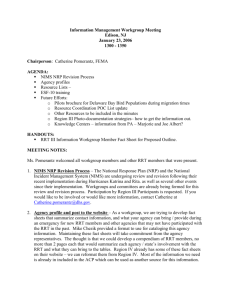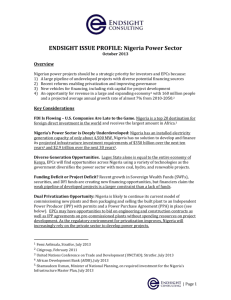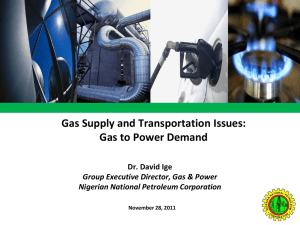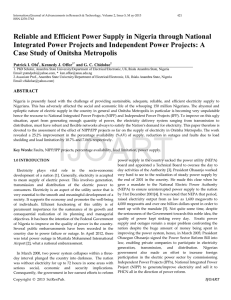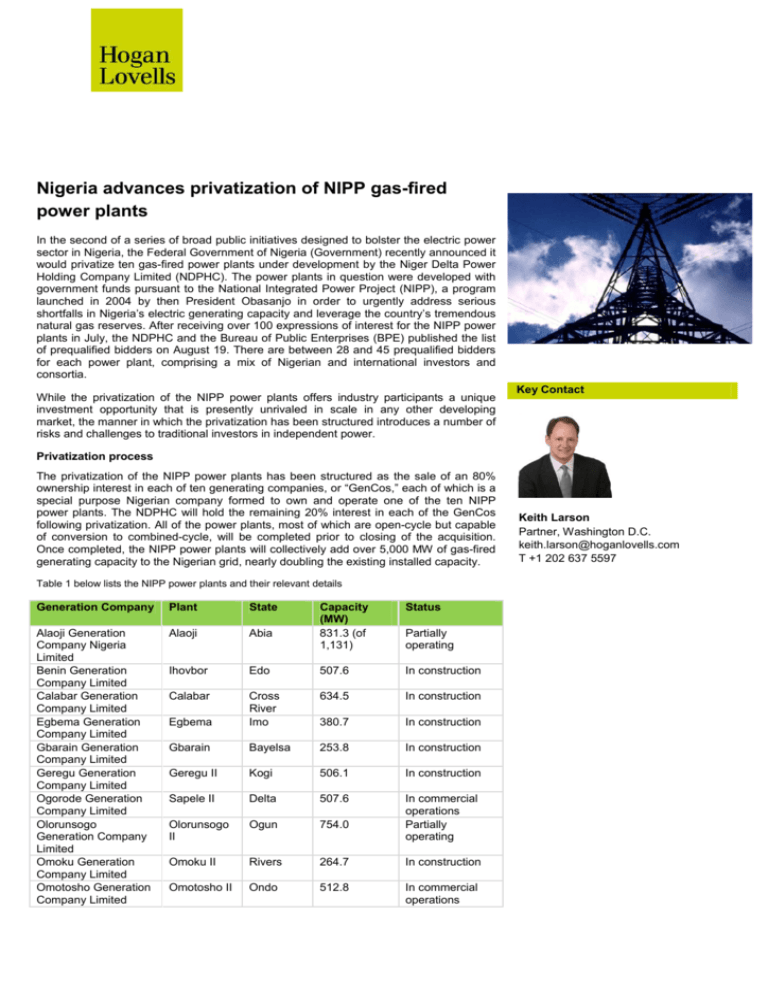
Nigeria advances privatization of NIPP gas-fired
power plants
In the second of a series of broad public initiatives designed to bolster the electric power
sector in Nigeria, the Federal Government of Nigeria (Government) recently announced it
would privatize ten gas-fired power plants under development by the Niger Delta Power
Holding Company Limited (NDPHC). The power plants in question were developed with
government funds pursuant to the National Integrated Power Project (NIPP), a program
launched in 2004 by then President Obasanjo in order to urgently address serious
shortfalls in Nigeria’s electric generating capacity and leverage the country’s tremendous
natural gas reserves. After receiving over 100 expressions of interest for the NIPP power
plants in July, the NDPHC and the Bureau of Public Enterprises (BPE) published the list
of prequalified bidders on August 19. There are between 28 and 45 prequalified bidders
for each power plant, comprising a mix of Nigerian and international investors and
consortia.
While the privatization of the NIPP power plants offers industry participants a unique
investment opportunity that is presently unrivaled in scale in any other developing
market, the manner in which the privatization has been structured introduces a number of
risks and challenges to traditional investors in independent power.
Key Contact
Privatization process
The privatization of the NIPP power plants has been structured as the sale of an 80%
ownership interest in each of ten generating companies, or “GenCos,” each of which is a
special purpose Nigerian company formed to own and operate one of the ten NIPP
power plants. The NDPHC will hold the remaining 20% interest in each of the GenCos
following privatization. All of the power plants, most of which are open-cycle but capable
of conversion to combined-cycle, will be completed prior to closing of the acquisition.
Once completed, the NIPP power plants will collectively add over 5,000 MW of gas-fired
generating capacity to the Nigerian grid, nearly doubling the existing installed capacity.
Table 1 below lists the NIPP power plants and their relevant details
Generation Company
Plant
State
Capacity
(MW)
831.3 (of
1,131)
Status
Alaoji Generation
Company Nigeria
Limited
Benin Generation
Company Limited
Calabar Generation
Company Limited
Egbema Generation
Company Limited
Gbarain Generation
Company Limited
Geregu Generation
Company Limited
Ogorode Generation
Company Limited
Olorunsogo
Generation Company
Limited
Omoku Generation
Company Limited
Omotosho Generation
Company Limited
Alaoji
Abia
Ihovbor
Edo
507.6
In construction
Calabar
634.5
In construction
Egbema
Cross
River
Imo
380.7
In construction
Gbarain
Bayelsa
253.8
In construction
Geregu II
Kogi
506.1
In construction
Sapele II
Delta
507.6
Olorunsogo
II
Ogun
754.0
In commercial
operations
Partially
operating
Omoku II
Rivers
264.7
In construction
Omotosho II
Ondo
512.8
In commercial
operations
Partially
operating
Keith Larson
Partner, Washington D.C.
keith.larson@hoganlovells.com
T +1 202 637 5597
Turn-key opportunity
Dismissing the customary approach followed by developing countries of courting international sponsors to develop, finance, and
construct independent power projects, the NDPHC is completing, and selling majority ownership of, ten fully operational and contracted
power plants in Nigeria, complete with contractor warranties and fully agreed long-term power purchase, gas supply, interconnection,
and other project agreements. According to the NDPHC, “[ b ]idders will receive a new, commissioned power plant along with all
necessary contractual structures. This will avoid the need to wait to have all contractual structures in place and avoid the risks of
construction and commissioning.”
The NDPHC has clarified that all of the NIPP power plants must be commissioned and completed prior to sale. Each of the plants has
been or is presently being constructed by international EPC contractors using proven technology and established OEMs, and will
benefit from warranties following construction (although some of the warranties on already-completed plants have expired). Certain
NIPP power plants have long term service agreements in place with an original term of ten years of which the initial five years is fully
funded. Following the initial five year period, bidders will be free to continue with the existing contract or replace it.
Each GenCo will, pursuant to a 20-year power purchase agreement, sell the electric power generated at its power plant to Nigerian
Bulk Electricity Trading PLC (NBET), a special purpose company formed by the Government in 2010 to act as an intermediary between
generation companies and the recently-privatized distribution companies. The power tariff will reflect the rates set forth in the most
recent Multi-year Tariff Order (effective from June 1, 2012 until May 31, 2017). NBET will make monthly capacity payments reflecting
capital, equity return, and fixed operation and maintenance costs plus monthly energy payments reflecting a pass-through of fuel costs
and variable operation and maintenance expenses in respect of energy delivered. Payments will be made in Naira although a portion of
the payment obligations will be indexed to U.S. dollars. All of the NIPP power plants will be connected to the national grid.
Each GenCo will procure its gas supply pursuant to a long-term gas supply agreement with the Gas Aggregation Company of Nigeria
Limited (GACN). GACN was organized on January 5, 2010 and is owned by the upstream joint ventures formed between NNPC and
one or more of the international oil companies operating in Nigeria. However, the GenCos will be permitted to enter into separate gas
supply agreements with other gas suppliers for any additional gas needs to cover future expansion as well as to back-stop the supply
obligations of the GACN. Gas transportation services will be provided by the state-owned Nigerian Gas Company Limited.
In terms of credit support, the Government has taken the responsibility to fund NBET to guarantee liquidity of the system in the event
that, for example, NBET does not receive payment from a distribution company in respect of electricity delivered to NBET by a GenCo.
However, the Government has also said it will only guarantee termination payments under the power purchase agreement —
calculated as a buyout amount covering capital invested and a negotiated rate of return. A bidder may therefore encounter a situation
where it is forced to terminate the power purchase agreement and exit the project in order to recover its investment.
A new direction?
The Government deserves credit for implementing a program and designing a tender process that both addresses the lack of reliable
generating capacity and facilitates the private ownership of power generation in Nigeria. In addition, there is some merit to the
approach of offering investors completed, fully contracted projects, as the NIPP power plants have a higher value (and financing should
be easier to obtain) once construction is completed, and the Government can ensure that offtake and fuel supply contract terms are
relatively uniform across the sector. For the Government, it is much easier and far less time consuming to evaluate bids for fully
developed assets than it is to negotiate power purchase agreements for undeveloped projects. For an investor, the NIPP privatization
offers a unique opportunity to enter the power sector in Nigeria without committing the time and capital required to develop a new
project.
The build-and-privatize model seems likely to continue. In fact, the NDPHC has announced that the proceeds from the sale of the
GenCos will be reinvested primarily in the power sector, including in certain hydropower projects which, like the NIPP power plants, will
likely be privatized in whole or in part once developed. However, while the NIPP power plants or future NDPHC plants may be fully
structured, they are not free from risk.
First, political risk remains high, as localized ethnic violence has led numerous energy companies to exit Nigeria or focus on more
remote offshore areas. Although power projects are generally perceived to be less susceptible to political violence — insofar as local
communities that benefit directly from increased access to electricity are less inclined to disrupt it — gas-fired power generation is
inextricably linked to the oil and gas sector in Nigeria, and gas supply infrastructure remains a key target of those seeking to attack
foreign oil companies. As evidence of this, electricity generation has fallen 40% from its peak of 4,500 MW in December 2012 to 2,628
MW in August 2013, primarily due to interruptions in gas supply resulting from pipeline damage or sabotage. An astonishing 624 MW of
this shortage is attributable to one of Nigeria’s newest gas-fired power plants — the Afam VI power plant near Port Harcourt — which
has no reliable gas supply due to crude oil theft related leaks on its main supply pipeline. Project agreements for the NIPP power plants
will not be financeable if they do not properly take into account political risk and offer adequate protections to the GenCos against such
risk, including continued payment for power generating capacity that may not be available due to such risk.
More importantly, the NIPP power plants are exposed to Nigerian government risk from almost every angle. All of the counterparties to
the project agreements (other than the EPC contracts) are relatively new organizations that are part of or largely controlled by the
Government, and some of them have almost no record of operating performance. Complicating matters further, the co-ownership of the
GenCos by the NDPHC introduces a number of additional uncertainties. For instance, it is difficult to predict how the NDPHC, which is
itself owned by a vast consortium of federal, state, and local governments, will administer its ownership interest in the GenCos, or
whether it has the resources to do so. The NDPHC has clarified that it expects to have a position on each GenCo’s board of directors
and be required to fund all capital calls or else risk dilution of its interest. However, issues regarding board composition, minority control
rights, deadlock resolution, restrictions of transfer of shares and indemnification claims under the share sale agreement can
significantly affect the value of the bidder’s 80% interest and therefore require substantial analysis, discussion, and negotiation.
Ultimately, the critical question is whether the Government has properly allocated the foregoing risks, and prepared a suite of
enforceable project agreements which effectuate that risk allocation, in a manner that will attract debt capital and entice the class of
investors who have the risk appetite to pursue power generation opportunities in Nigeria to submit bids. If it has not, investors who are
adept at assembling and structuring successful projects in developing markets may not be able to establish a reliable valuation of the
NIPP power plants, particularly in an environment where rapidly changing expectations about long-term natural gas prices makes it
increasingly difficult to value natural gas-fired projects. For all of its foresight in structuring the NIPP privatization, the NDPHC may
discover that it has only succeeded in further discouraging investment by international independent power companies and utilities.
Hogan Lovells has advised on numerous power projects in Nigeria and throughout sub-Saharan Africa.
www.hoganlovells.com
"Hogan Lovells" or the "firm" is an international legal practice that includes Hogan Lovells International LLP, Hogan Lovells US LLP and their affiliated businesses.
The word "partner" is used to describe a partner or member of Hogan Lovells International LLP, Hogan Lovells US LLP or any of their affiliated entities or any employee or consultant with equivalent standing. Certain
individuals, who are designated as partners, but who are not members of Hogan Lovells International LLP, do not hold qualifications equivalent to members.
For more information about Hogan Lovells, the partners and their qualifications, see www.hoganlovells.com.
Where case studies are included, results achieved do not guarantee similar outcomes for other clients. Attorney Advertising.
© Hogan Lovells 2013. All rights reserved.



